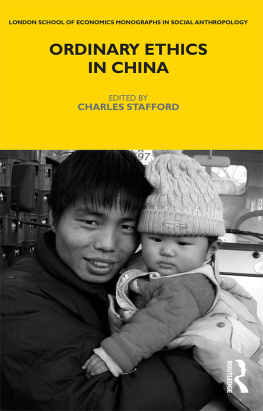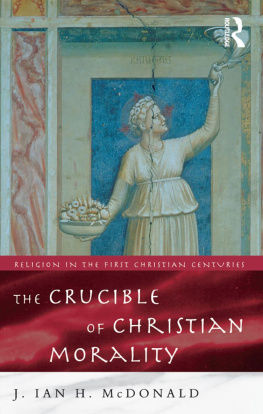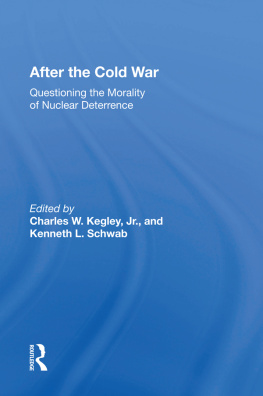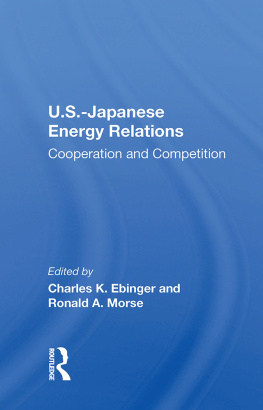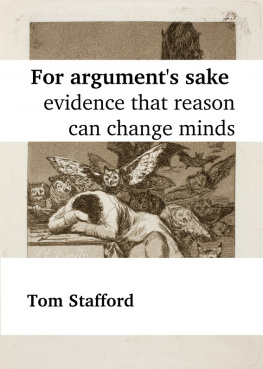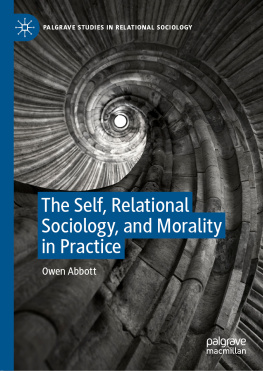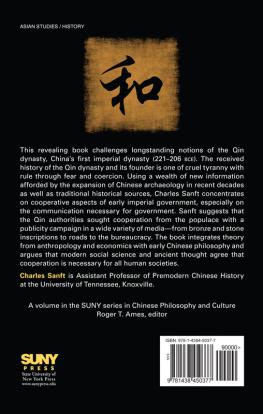Charles Stafford - Cooperation in Chinese Communities: Morality and Practice
Here you can read online Charles Stafford - Cooperation in Chinese Communities: Morality and Practice full text of the book (entire story) in english for free. Download pdf and epub, get meaning, cover and reviews about this ebook. year: 2019, publisher: Bloomsbury Academic, genre: Home and family. Description of the work, (preface) as well as reviews are available. Best literature library LitArk.com created for fans of good reading and offers a wide selection of genres:
Romance novel
Science fiction
Adventure
Detective
Science
History
Home and family
Prose
Art
Politics
Computer
Non-fiction
Religion
Business
Children
Humor
Choose a favorite category and find really read worthwhile books. Enjoy immersion in the world of imagination, feel the emotions of the characters or learn something new for yourself, make an fascinating discovery.

- Book:Cooperation in Chinese Communities: Morality and Practice
- Author:
- Publisher:Bloomsbury Academic
- Genre:
- Year:2019
- Rating:3 / 5
- Favourites:Add to favourites
- Your mark:
- 60
- 1
- 2
- 3
- 4
- 5
Cooperation in Chinese Communities: Morality and Practice: summary, description and annotation
We offer to read an annotation, description, summary or preface (depends on what the author of the book "Cooperation in Chinese Communities: Morality and Practice" wrote himself). If you haven't found the necessary information about the book — write in the comments, we will try to find it.
Cooperation in Chinese Communities: Morality and Practice — read online for free the complete book (whole text) full work
Below is the text of the book, divided by pages. System saving the place of the last page read, allows you to conveniently read the book "Cooperation in Chinese Communities: Morality and Practice" online for free, without having to search again every time where you left off. Put a bookmark, and you can go to the page where you finished reading at any time.
Font size:
Interval:
Bookmark:

Managing Editor: Laura Bear
The Monographs on Social Anthropology were established in 1940 and aim to publish results of modern anthropological research of primary interest to specialists. The continuation of the series was made possible by a grant in aid from the Wenner-Gren Foundation for Anthropological Research, and more recently by a further grant from the Governors of the London School of Economics and Political Science. Income from sales is returned to a revolving fund to assist further publications. The Monographs are under the direction of an Editorial Board associated with the Department of Anthropology of the London School of Economics and Political Science.

CONTENTS
Charles Stafford, Ellen R. Judd and Eona Bell
Charles Stafford
Anni Kajanus
Dsire Remmert
Magdalena Wong
Hsiao-Chiao Chiu
Andrea E. Pia
Cecilia Liu
Meixuan Chen
Di Wu
I-Chieh Fang
Eona Bell
Mark Stanford
Ellen R. Judd
Eona Bell is an Affiliated Lecturer in Social Anthropology at Cambridge University and Research Officer at the London School of Economics. She has carried out fieldwork in Chinese communities in the UK and is now doing archival research on overseas Chinese temples in Singapore.
Meixuan Chen is Newton Fund Senior Research Fellow at the University of Bristol. She is the co-author of a recent publication on rural welfare in China and Vietnam.
Hsiao-Chiao Chiu is a Postdoctoral Research Fellow at the University of Edinburgh, working on the ERC-funded project A Global Anthropology of Transforming Marriage. For this project she is conducting research in Jinmen and southeast China on changes to marriage in the contrasting regimes of Taiwan and China.
I-Chieh Fang is Assistant Professor of Anthropology at National Tsing Hua University, Taiwan. She has recently been conducting research on how migrants learn through practice under the context of both urbanization and counter-urbanization.
Ellen R. Judd is Distinguished Professor and Professor of Anthropology at the University of Manitoba. She is the author of Gender and Power in Rural North China and is currently completing a project on inclusion/exclusion, cooperation and mutuality in rural and migrant south China.
Anni Kajanus has been Leverhulme Early Career Fellow at London School of Economics and is taking up an Assistant Professorship in Social and Cultural Anthropology at the University of Helsinki. She is the author of Chinese Student Migration, Gender and Family. Her recent research, which explores human cooperation, competition and conflict, brings together methods and approaches from anthropology and developmental psychology.
Cecilia Liu has been Postdoctoral Researcher at the Max Planck Institute for Social Anthropology. She is the author of articles in English and Chinese on post-socialist welfare, gender and other topics. In addition to lecturing in anthropology at Chinese universities, she is preparing for a new project that will explore urban life through a comparative perspective.
Andrea E. Pia is Assistant Professor of Anthropology at the London School of Economics. His first book manuscript, The Peoples Lifeline: Moving Water and the Political in Southwest China, examines questions of human cooperation through the lenses of Chinas ongoing water crisis.
Dsire Remmert has been Postdoctoral Researcher at the University of Teubingen and is now Visiting Fellow at the London School of Economics. She has conducted fieldwork in urban China and Taiwan and recently worked on a project examining intergenerational differences in decision-making and notions of fate in Taipei.
Charles Stafford is Professor of Anthropology at the London School of Economics. He is the editor of Ordinary Ethics in China, and the author of Economic Life in the Real World: Logic, Emotion and Ethics (forthcoming).
Mark Stanford is Postdoctoral Researcher in cognitive anthropology and Fellow of Wolfson College, Oxford. He has carried out research on morality and cooperation in China and Myanmar, and is currently involved in a multinational project on religion and moral psychology.
Magdalena Wong is Honorary Assistant Professor in the School of Chinese, Hong Kong University, and Part-Time Lecturer at the Chinese University of Hong Kong. She obtained her PhD in anthropology at LSE in 2017 and is doing further research on questions related to gender.
Di Wu is Senior Research Associate at Sun Yat-Sen University, China and Senior Teaching Fellow at SOAS, University of London. He carried out his doctoral research in Zambia looking at issues of cross-cultural communication, moral interaction and community building. Recently, he has been conducting fieldwork along the China-North Korean border.
Charles Stafford, Ellen R. Judd and Eona Bell
This book focuses on the challenges faced by ordinary Chinese people when they try to cooperate with others, for example, when it comes to conducting rituals, caring for the elderly, running community schools, allocating shared resources such as water and so on. But cooperation is an extremely general term and one that covers a great deal of ground what exactly does it mean? In English, when we say that two or more people are cooperating we usually just mean they are engaged in a joint activity of some kind with a common purpose: moving a table together, building a house together and so forth. A similar term in Chinese is hezuo, literally doing [something] together. For example, one might say: The people in that village cooperate [hezuo] by sharing out childcare duties between households.
Notably, in the real-world contexts studied by anthropologists, activity of this kind very often has a strong element of reciprocity built into it: This week youre watching our children but its understood that next week, or the week after, it will be our turn. Indeed, anthropologists typically describe and theorize cooperation in terms of reciprocity rather than in terms of cooperation per se. Following Marcel Mauss, they seek to understand what compels people to engage in reciprocal social activities such as back-and-forth exchanges of gifts, favours, mutual support, marriage partners and so forth. Further to this, the moral obligations that underpin reciprocity in human societies have long been a focus of anthropological study. This is not because anthropologists believe that the morality of reciprocity is universal the same everywhere but rather because it manifests itself so differently, and so interestingly, across human societies and over time (for the particular case of China, see Yan 1996).
Meanwhile, scholars from a wide range of other disciplines including evolutionary biology, developmental psychology, institutional economics and many others have also investigated the moral bases of human cooperation. Of course, these scholars know well that a high proportion of cooperation is reciprocal in kind. They also know well that actual practices and institutions of cooperation vary both in time and space, sometimes dramatically. Nevertheless, a good deal of the non-anthropological research on cooperation aims to uncover its universal bedrock, history and culture notwithstanding. For example, psychologists have asked whether we have evolved psychological dispositions that support cooperation, such as an intuitive preference for treating others fairly. Further to this, one can ask if the problems that we have when cooperating with each other (e.g. encountering people who do
Next pageFont size:
Interval:
Bookmark:
Similar books «Cooperation in Chinese Communities: Morality and Practice»
Look at similar books to Cooperation in Chinese Communities: Morality and Practice. We have selected literature similar in name and meaning in the hope of providing readers with more options to find new, interesting, not yet read works.
Discussion, reviews of the book Cooperation in Chinese Communities: Morality and Practice and just readers' own opinions. Leave your comments, write what you think about the work, its meaning or the main characters. Specify what exactly you liked and what you didn't like, and why you think so.

